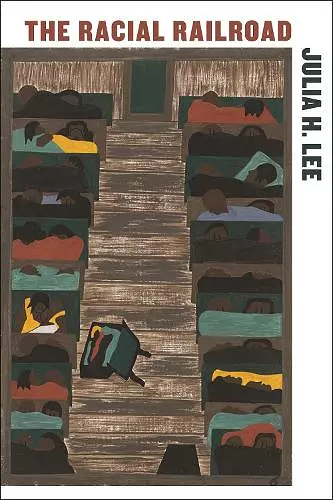The Racial Railroad
Format:Paperback
Publisher:New York University Press
Published:26th Apr '22
Should be back in stock very soon

Reveals the legacy of the train as a critical site of race in the United States
Despite the seeming supremacy of car culture in the United States, the train has long been and continues to be a potent symbol of American exceptionalism, ingenuity, and vastness. For almost two centuries, the train has served as the literal and symbolic vehicle for American national identity, manifest destiny, and imperial ambitions. It’s no surprise, then, that the train continues to endure in depictions across literature, film, ad music.
The Racial Railroad highlights the surprisingly central role that the railroad has played—and continues to play—in the formation and perception of racial identity and difference in the United States. Julia H. Lee argues that the train is frequently used as the setting for stories of race because it operates across multiple registers and scales of experience and meaning, both as an invocation of and a depository for all manner of social, historical, and political narratives.
Lee demonstrates how, through legacies of racialized labor and disenfranchisement—from the Chinese American construction of the Transcontinental Railroad and the depictions of Native Americans in landscape and advertising, to the underground railroad and Jim Crow segregation—the train becomes one of the exemplary spaces through which American cultural works explore questions of racial subjectivity, community, and conflict. By considering the train through various lenses, The Racial Railroad tracks how racial formations and conflicts are constituted in significant and contradictory ways by the spaces in which they occur.
"Julia Lee’s brilliant scholarly intervention is in rendering the railroad as THE technology for understanding American exceptionalism, racial exclusion, and racist state harm, as well as, contradictorily, the symbol of liberation and legitimation for so many non-white Americans who have struggled to lay claim to the U.S. The depth and breadth of Lee’s archive, from canonical American novels to contemporary films and music videos further reinforces the ubiquity of trains and the railroad in the racial hierarchies of the last two centuries and is a testament to Lee’s capacious intellect and scholarly rigor." * Jennifer Ho, author of Racial Ambiguity in Asian American Culture *
"A fascinating interdisciplinary book offering a sustained consideration of the railroad’s cultural iconicity from the suppressed perspective of racialized authors. Lee’s distinctive expertise in literary analysis and comparative race studies covers a broad and diverse archive that conveys the railroad’s racial implications and contestations across visual, acoustic, and literary forms." * Hsuan Hsu, author of The Smell of Risk: Environmental Disparities and Olfactory Aesthetics *
"Lee examines affinities between narratives and images of American exceptionalism and railroads, both of which narrowly orient perspective through the perception of movement. … Lee examines visual narratives of trains in railroad advertisements, in film history, and in reenactments. She examines narratives of Chinese degeneracy and Chinese American memory, of the survival and critique of Jim Crow, and of border crossings and the exploitation of migrant labor, all taking place on trains … offers valuable insights on how racism and exclusionary borders take shape through physical infrastructure." -- Manu Karuka * Public Books *
ISBN: 9781479812776
Dimensions: unknown
Weight: 467g
304 pages